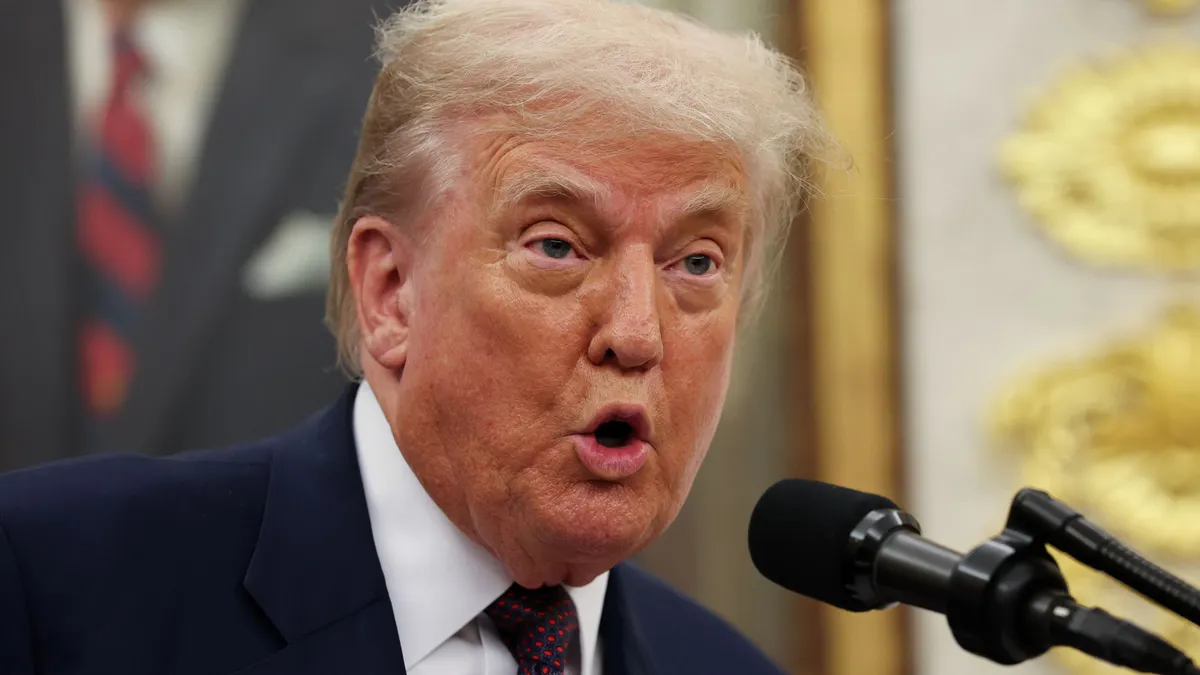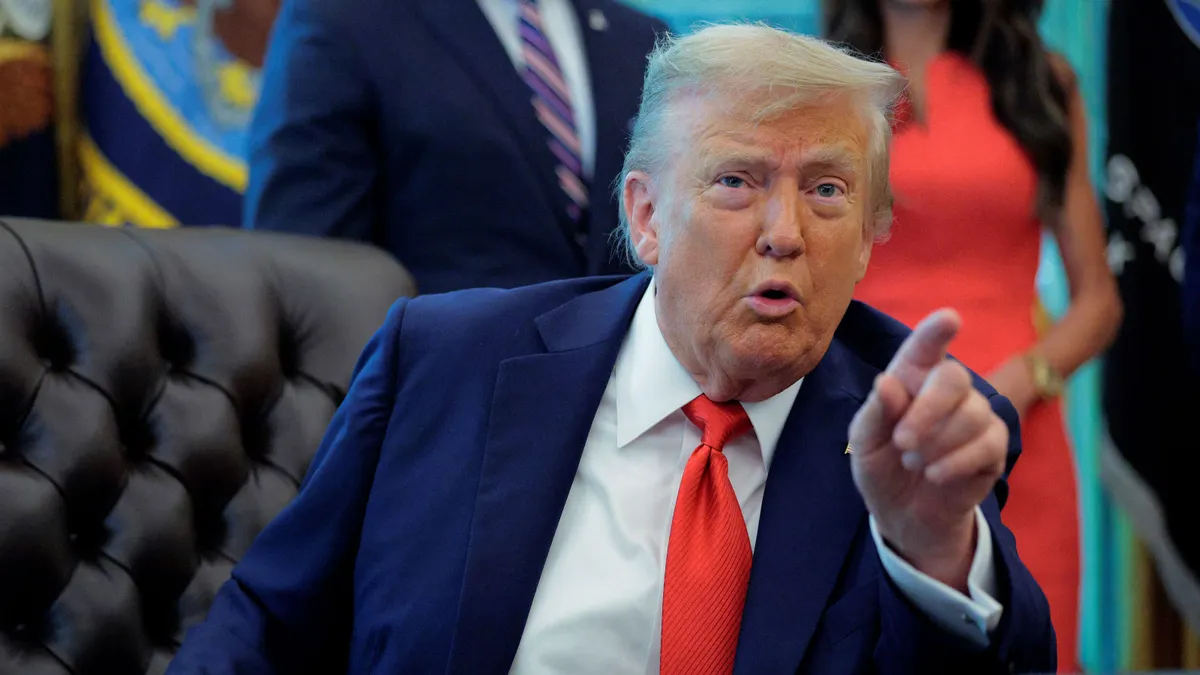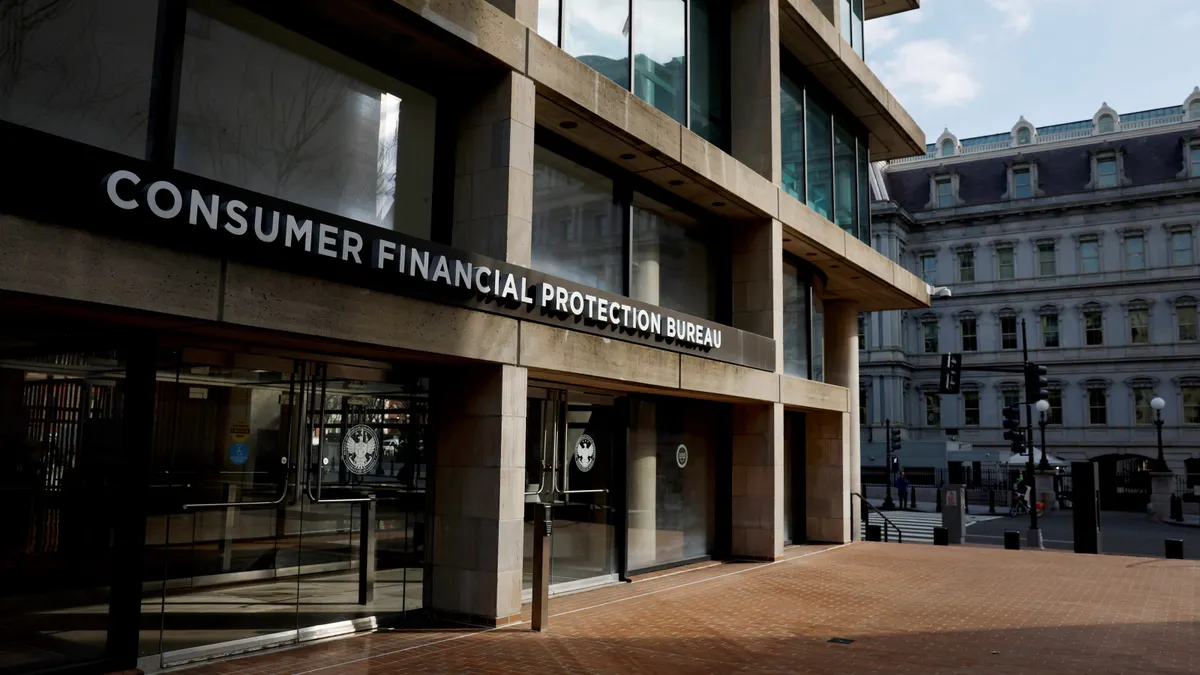A tombstone emoji was only the beginning.
When billionaire and Trump adviser Elon Musk on Friday posted “CFPB RIP” on X, the social media platform he owns, it was, to many, the first clue that the Department of Government Efficiency had infiltrated the agency.
By the end of that day, the CFPB would have a new acting director, its X profile would be deleted, and the central art on its webpage would be replaced by “404 error” text and a rudimentary illustration of an unplugged socket.
On his first full day leading the CFPB, Russ Vought wrote the Federal Reserve to indicate that the consumer protection bureau would not take any unappropriated funding for the fiscal quarter starting in April.
“The Bureau's current balance of $711.6 million is in fact excessive in the current fiscal environment,” Vought wrote Saturday on X. “This spigot, long contributing to CFPB's unaccountability, is now being turned off.”
Also Saturday, Vought wrote CFPB employees, instructing them to cease “all supervision and examination activity” and “all stakeholder engagement,” according to an email seen by The New York Times. They were also ordered to stop work on all proposed or final rules, enforcement, investigations, settlements, formal or informal guidance. Vought also suspended the effective dates of all final rules and ordered the bureau "not to issue public communications of any type," according to American Banker.
By Sunday, the CFPB’s chief operating officer, Adam Martinez, told the agency’s workforce that the bureau’s Washington headquarters would be closed from Feb. 10 through Feb. 14.
“Employees and contractors are to work remotely unless instructed otherwise from our Acting Director or his designee,” Martinez wrote Sunday in an email seen by The Wall Street Journal.
Workers who tried to retrieve their laptops from the office Sunday were turned away, employees told The New York Times.
Legal action
The National Treasury Employees Union, which represents CFPB employees, filed two lawsuits Sunday in a federal court in Washington – one to block Vought’s directives and the other urging a judge to keep DOGE from accessing employee records.
CFPB employees fear their employment data could be used “to blackmail, threaten or intimidate them,” according to the complaint, seen by The New York Times.
DOGE representatives initially had just “read-only” access to the agency’s personnel files, procurement records and budgeting and financial data, Bloomberg reported. But they received access to all of the bureau’s data systems, including sensitive bank examination and enforcement records, by late Friday, according to the wire service.
The union has not hidden its disdain for DOGE’s operations at the bureau. After three relatively young DOGE staffers were added to the CFPB’s directory Thursday, the NTEU said it “welcome[d] our newest colleagues and look forward to the smell of Axe Body Spray in our elevators.” The union went on to accuse the CFPB’s previous acting director, Treasury Secretary Scott Bessent, of “allow[ing] Musk's operatives to bypass cybersecurity policies and wreak havoc with their amateur code skills.”
About 100 union CFPB employees protested outside the bureau’s headquarters Saturday over DOGE’s presence, one observer wrote on the social media platform Bluesky.
Hanging in the balance, potentially, is the future employment of the CFPB’s workforce, which numbers about 1,700 – but only a few hundred positions are mandated by law, CNBC reported, citing a person with knowledge of the agency. Beyond that, the CFPB is the only regulator for nonbank lenders, which control a considerable swath of mortgages.
The CFPB cannot be closed without congressional action. But, failing that, Vought can “seriously hobble” the agency “through a bunch of slow bleeds,” Adam Levitin, a professor at Georgetown Law who specializes in financial regulation, told The New York Times.
“He’s trying to skip all the necessary steps and just go for an immediate death blow,” Levitin said. “He may not have the legal ability to actually do that, but I’m not sure how much that’s going to matter. A lot of the way the Trump administration has been dealing with regulatory agencies is just kind of a blitzkrieg tactic, where a key component is creating fear, uncertainty and chaos.”
Reaction from lawmakers
Lawmakers appeared split along party lines over the weekend’s developments.
“Accountability at the CFPB is long overdue. From [former Director Rohit] Chopra’s regulation by blog post to repeatedly ignoring the Chairman’s calls to stop rule makings after the election,” read a Saturday post on X from the Senate Banking Committee GOP account. “Acting Dir. Vought will bring responsibility back to the CFPB & refocus its mission to serve the American people.”
Rep. Maxine Waters, D-CA, and 80 House lawmakers wrote to Bessent on Friday (presumably before Vought was named acting director), to say they are “deeply alarmed and troubled” that agency leadership appeared to be “launching the Trump Administration’s plan to contravene the will of Congress and unlawfully ‘delete’ this popular consumer watchdog.”
“Delete,” of course, is a direct reference to Musk’s preferred fate for the agency, which he expressed in November on X.
“We urge you to immediately rescind what appears to be an illegal stop work order and allow the public servants at the CFPB to get back to work for the American people as required by law,” Waters and the others wrote Friday.
Vought, for his part, said in his memo Saturday that he is “committed to implementing the president’s policies, consistent with the law, and acting as a faithful steward of the bureau’s resources.”
But he pushed oft-cited Republican rhetoric in an X post Sunday, saying the CFPB “has been a woke & weaponized agency against disfavored industries and individuals for a long time. This must end.”
Strategy
By refusing further funding from the Fed, Vought may be testing a clause in the Dodd-Frank Act that states the CFPB is funded through the “combined earnings of the Federal Reserve System.” Technically speaking, the Fed has had no earnings over the past two years.
In a thinly veiled attempt to nullify the agency, a pair of trade groups in 2018 sued the CFPB, alleging its funding structure was unconstitutional because it received appropriations through the Fed rather than Congress. The Supreme Court last May upheld the CFPB’s funding mechanism.
Sen. Elizabeth Warren, D-MA, the CFPB’s architect, said Saturday on Facebook that “Republicans have failed to gut [the bureau] in Congress and in the courts.”
“They will fail again,” she wrote.
Warren, Waters and other lawmakers are slated to appear Monday at a rally outside CFPB headquarters, backed by Americans for Financial Reform and other groups.
The Consumer Federation of America, a nonprofit advocacy group, accused Musk of having a personal agenda with the CFPB.
“DOGE’s continued aggressive movement into the CFPB is an obvious targeted attempt by Musk to assert control over the agency that he perceives as an obstacle to moving his beloved X into the payments space,” Erin Witte, the CFA’s director of consumer protection, told Politico.
A day before being tapped to lead the CFPB on an acting basis, the Senate confirmed Vought as director of the Office of Management and Budget. Vought is an architect of the conservative blueprint Project 2025 and, under that plan, any civil penalties the CFPB collects that don’t go toward reimbursing consumers would be directed to the Treasury Department. Congress would also be urged to repeal Section 1071 of the Dodd-Frank Act.





















